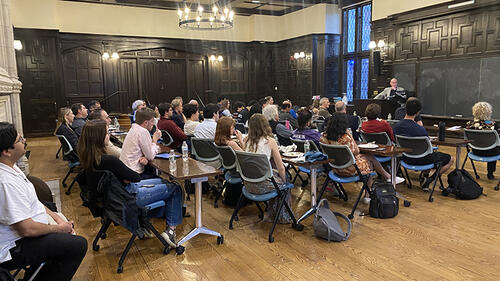
Pulitzer-Prize winning author Richard Rhodes came to campus on April 16 to give a keynote talk on “The Rise of Malignant Deterrence”, as well as a writing workshop for a science and engineering audience. He also attended one-on-one meetings and a luncheon.
Rhodes’ visit was hosted by the Kimball Smith Series and co-sponsored by the Department of History, the Department of Physics, the Department of Political Science, and Wright Lab.
The series of events was initiated by Steve Lamoreaux, professor of physics and a member of Yale’s Wright Lab, who originally invited Rhodes to give a guest lecture for his undergraduate course called “Impact of the Atom”. Lamoreaux explained that the logistics of scheduling Rhodes during the time of the class did not work out, but the students in the course were able to attend the keynote and the other events during the day, along with the greater Yale community.
Lamoreaux said, “Richard Rhodes brought the story of the Manhattan project into the open; at the time he wrote “The Making of the Atomic Bomb,” very little official documentation on the project had been released. The Department of Energy started opening troves of information—warehouses full—and it was a lot of work to sift through it all. His book stands the test of time.”
Lamoreaux continued, “I doubt the interest in Oppenheimer would have developed, and further developed into an outstanding movie, had it not been for “The Making of the Atomic Bomb”.
Alexandra Paulus—an undergraduate student who co-organized the events on behalf of the Kimball Smith Series and moderated the evening program—explained that during the seminar, “Rhodes discussed how and why nuclear deterrence, which has historically served as a means of conflict prevention, is becoming increasingly weaponized as an enabler of aggression.”
Paulus said, “It was an absolute honor and pleasure to spend the day with Richard Rhodes! Mr. Rhodes spoke to what was one of the most intellectually diverse rooms I have been in at Yale, full of undergraduates, graduate students, faculty members, and other Yale affiliates heralding from departments ranging from Physics to Philosophy to Energy Studies. I’m grateful to my fellow program coordinators on the Kimball Smith Series team for helping organize such a successful day.”
Rhodes is a member of the Yale Class of 1959. He is the author or editor of twenty-six books including “The Making of the Atomic Bomb,” which won a Pulitzer Prize in Nonfiction, a National Book Award and a National Book Critics Circle Award; “Dark Sun: The Making of the Hydrogen Bomb,” which was one of three finalists for a Pulitzer Prize in History; and, most recently, “Scientist,” a biography of the biologist Edward O. Wilson. He has received numerous fellowships for research and writing, including grants from the Ford Foundation, the Guggenheim Foundation, the MacArthur Foundation and the Alfred P. Sloan Foundation. He has been a host and correspondent for documentaries on public television’s “Frontline” and “American Experience” series. His play, “Reykjavik,” about the historic summit meeting between Ronald Reagan and Mikhail Gorbachev in Reykjavik, Iceland, in October 1986, has been performed at Stanford University and in Washington, D.C.